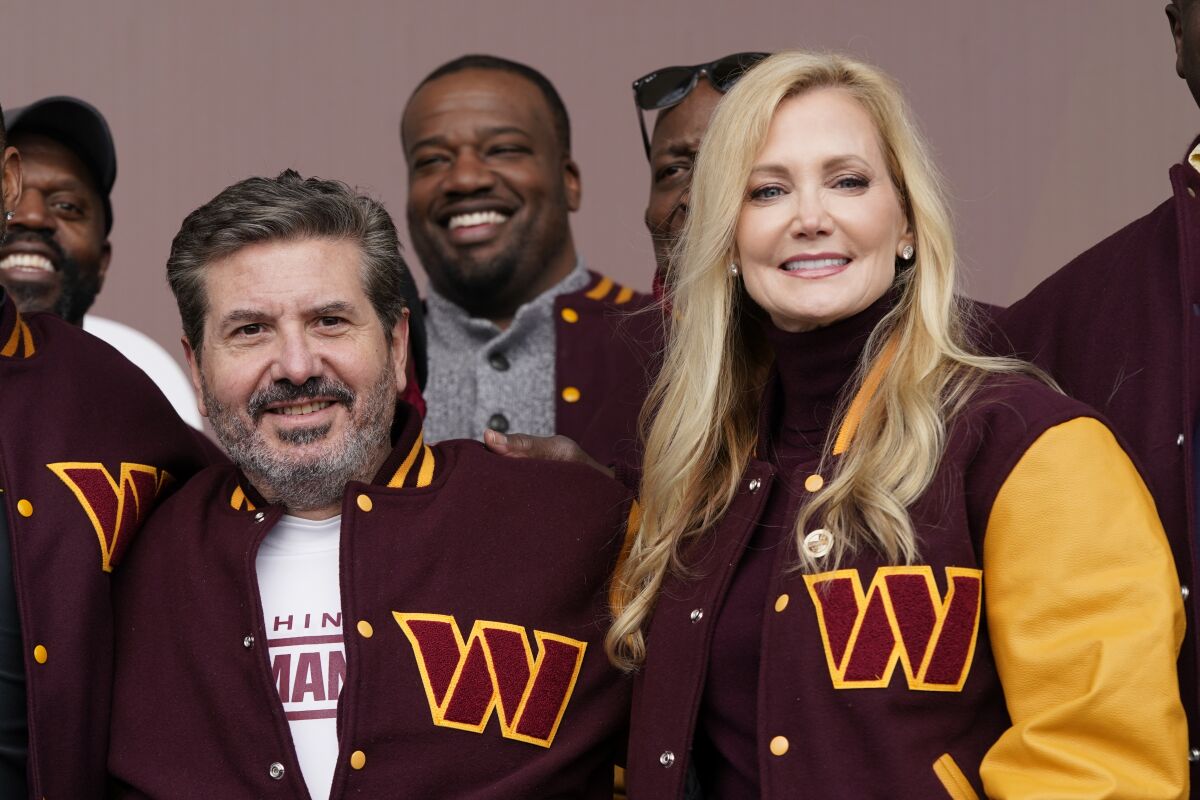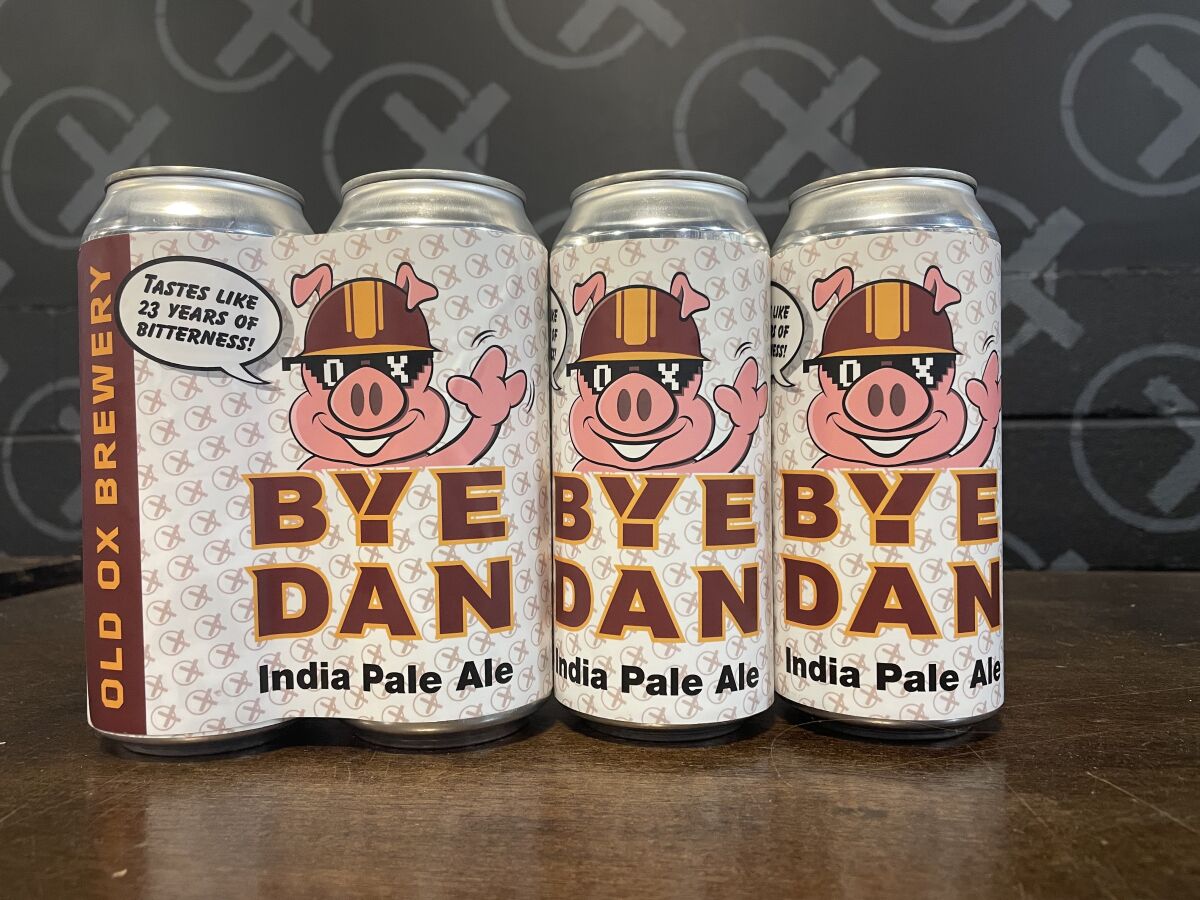Not only is Dan Snyder out as owner of the Washington Commanders but also he has been canned.
In fact, creators of the “Bye Dan” beer celebrating his departure cannot keep cans of that craft brew in stock.
“We’re up to almost 2,000 individual orders and we’re still getting calls for it every day,” said Chris Burns, owner of Old Ox Brewery of Ashburn, Va., located less than a mile from Commanders headquarters.
“I’ve had people crying on the phone just because they’re so happy that he’s going to be gone.”
On March 28, a group led by Josh Harris that includes Magic Johnson submitted their fully financed offer to buy the Washington franchise with reports the bid had met Snyder’s asking price.
On May 12, the Harris group came to terms on a deal with Snyder and his family for a record $6.05 billion.
That will be the highest purchase price for a North American professional sports franchise, surpassing the $4.55 billion Walmart heir Robert Walton paid to buy the Denver Broncos last year.
Owners convened in Minnesota this week for their spring meetings. Although the pending sale of the Commanders remained a talking point, no vote was taken before the meetings closed Wednesday.
The league’s preference is to have the deal approved before the regular season, according to Indianapolis Colts owner Jim Irsay, a member of the league finance committee. It takes a three-fourths majority (24 of 32 owners) to approve a team sale.
“There’s certain criteria that has to be met, and that’s just the way it is,” Irsay said during the meetings. “It’s not there yet, but it doesn’t mean that it can’t get there. It’s complicated. Put it that way. I could explain it to you, and it wouldn’t tell you anything.”
Neither Snyder nor his wife, Tanya, came to Minnesota for the meetings. Many Commanders fans would be happy to never see them again.
Owners of sports franchises are frequently derided, particularly when those teams are so unsuccessful on the field, but Snyder is a special case. Not only was he the worst owner in NFL history, but also possibly the worst in any sport.

Dan and Tanya Snyder, co-owner and co-CEOs of the Washington Commanders, pose in team jackets. After years of scrutiny, they sold the NFL team.
(Patrick Semansky / Associated Press)
First, the futility on the field. From 1969 to 1998, the Washington Redskins — as they were previously known — appeared in five Super Bowls, won three, and had just seven losing seasons.
In the 24 years Snyder owned the team, Washington had twice as many losing seasons, had two one-and-done playoff appearances, cycled through 10 head coaches and compiled a record of 164-220-2.
The season-ticket wait list, which the club once boasted to be 200,000 names long, winnowed to nothing. The seating capacity at FedExField was reduced from more than 90,000 to just more than 62,000, as some seats were removed and others were tarped.
That’s not to say the franchise lost value. On that front, Snyder was tremendously successful. He purchased the team in 1999 for $800 million and the sale price will be nearly eight times that.
His boorish and bullying behavior, however, and the atmosphere it created led charges of sexual harassment and financial improprieties, triggering investigations by Congress, the NFL and multiple state attorneys general.
Snyder largely has been in the background for the last two years. In July 2021, as a result of the NFL’s investigation into the toxic culture of the franchise, the league fined the Commanders $10 million and announced that Snyder’s wife would take over day-to-day duties of running the club for an unspecified period.
Although it’s highly unusual for NFL team owners to level public criticism of each other, Irsay did so last fall when referencing a league-commissioned investigation of the workplace culture Snyder created.
“I’m not sure how that report’s going to come out,” Irsay told the Washington Post in October. “But what already has come out is extremely disturbing, and I disagree with the process. And I most likely disagree that we haven’t discussed something more severe such as him being removed as owner. As I said, it’s not something that I’m saying we should do. I’m saying it’s something that has to be given serious consideration.”

Chris Burns, owner of Old Ox Brewery of Ashburn, Va., created Bye Dan beer, a sendoff to Washington Commanders owner Dan Snyder.
(Courtesy of Chris Burns)
“You’re seeing fans that have been kind of ashamed of their fandom reemerging. Not that they weren’t fans, just that they were ashamed to admit it.”
— Chris Burns, owner of Old Ox Brewery of Ashburn, Va. and a Commanders fan
Snyder, then a 34-year-old marketing executive, glided through the approval process with a 31-0 vote of owners when he bought the team. He called the purchase “the most wonderful thing that’s ever happened to me. I’m a fan, a huge fan. It’s that simple.”
Early in his tenure, there were indications of Snyder’s outsized ego. He was known to drop into Redskins practices via helicopter.
“We’re out at Redskins Park one day and one of the PR guys comes in and says, `We’d just like you to know that if you’re going to talk to Mr. Snyder, please don’t call him Dan. Call him Mr. Snyder,’ ” recalled Len Shapiro, longtime NFL writer for the Washington Post. “I said to myself, `Well, he’ll be Dan in my book until the day I die.’ That was the first hint that, uh oh, this is going to be a little different with this guy.”
Different it was. Washington was the first NFL team to charge fans to view training camp, was caught selling stale peanuts to fans — the bags were from an airline that had gone under a year earlier — and serving expired beer that was months past its “freshness date.”
Meanwhile, Snyder was meddlesome with his coaches. In John Feinstein’s book, “Next Man Up,” he describes a couple of interactions in 1999 between Snyder and Washington defensive coordinator Mike Nolan.
Believing the team was too plain and predictable on defense, the first-year owner had a gallon of 31 Flavors ice cream left on Nolan’s desk with a note that read, “This is what I like. Not vanilla.”
Nolan was good humored about it, sending back a note reading, “Thanks for the ice cream. My kids enjoyed it.”
But the coach wasn’t as pleased later that season after a loss to Dallas when he returned to his office and found three soupy canisters of melted ice cream on his desk and a note that said, “I wasn’t joking. I do not like vanilla.”
That is only a sampling of the Snyder stories, the most insidious of which bubbled to the surface in 2018 when the New York Times detailed a 2013 trip to Costa Rica that Washington cheerleaders took for a photo shoot.
According to the newspaper, some of the cheerleaders said they were required to pose topless and that the photo sessions were observed by an all-male contingent of sponsors and FedExField suite holders. One evening, the squad’s director allegedly told nine of the 36 cheerleaders they had been selected by the sponsors to be their personal escorts to a nightclub.
Two years later, the Washington Post released a report in which 15 women alleged they were sexually harassed and verbally abused by former team employees. The club announced it had hired attorney Beth Wilkinson to “conduct a thorough independent review of this entire matter and help the team set new employee standards for the future.” The NFL took over the investigation in August, 2020.
The year-long Wilkinson investigation led to the $10 million fine and to Snyder handing over operations to his wife, but did not include public release of a written report.
In a written statement, Snyder said: “It is now clear that the culture was not what it should be, but I did not realize the extent of the problems, or my role in allowing that culture to develop and continue. I know that as the owner, I am ultimately responsible for the workplace.”
In 2022, more allegations surfaced against Snyder, including former Washington employee Jason Friedman testifying before the House Oversight Committee about alleged financial improprieties, including the franchise withholding ticket revenue that was supposed to be shared with other teams. The club staunchly denied doing so.
Seven months later, the Snyders announced they had hired Bank of America Securities to consider “potential transactions” for selling the team.
The prospect of a sale set the stage for “Bye Dan” beer, the first 300-case batch of which sold out in little more than an hour. Since, the brewery has taken online orders for two much larger batches.
The orders have come from all over the country — including one fan who plans to fly from Wyoming to pick up his beer — and include some from former Washington players. The can features a cartoon hog waving so long, and touts an IPA that “Tastes like 23 years of bitterness!”
“You’re seeing fans that have been kind of ashamed of their fandom reemerging,” Burns said. “Not that they weren’t fans, just that they were ashamed to admit it. You’re seeing more jerseys on the streets now. You’re hearing people talk about the team who haven’t talked about the team in years.
“It’s a reawakening.”
